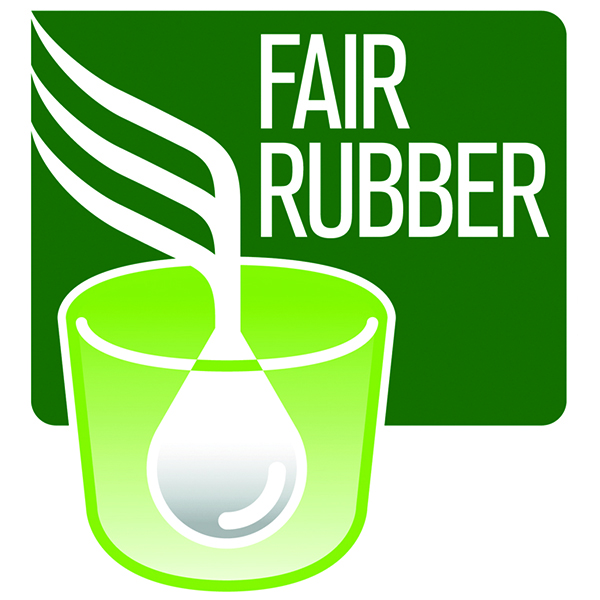Founded in 2012 the Fair Rubber Association strives for the improvement of working and living conditions of the primary producers of natural rubber. In order to achieve this goal they apply the ten principles of Fair Trade set by the WFTO in rubber trade: to create opportunities for disadvantaged producers, transparency, fair trade practices, fair payment, no child nor forced work, no discrimination, good working conditions, to empower the producers, to promote Fair Trade, ecological sustainability (more information: www.wfto.com). To guarantee the latter all plantations the Fair Rubber Association works with must be FSC®-certified. If necessary the association assists the producers during the certification process. In this way the Fair Rubber Association combines high ecological standards with dair working conditions.
Products complying with theses criteria are allowed to show the Fair Rubber logo. Unlike other certification marks or labels the suppliers don’t have to pay anything für the Fair Rubber logo. The costs incurred (e.g. for monitoring) are balanced with the Association’s membership fees. The Fair Rubber Associaiton currently cooperates with four suppliers: Frocester Estate and Lalan Rubbers Ltd. (Sri Lanka), New Ambadi (South India) and the Green Net Cooperative (Thailand). To be allowed to buy rubber from these plantations one has to be a member in the Fair Rubber Association.
Since 2012 more than 400,000 t of DRC (dry rubber content) have been traded fairly and thus gained Fair Trade premiums surpassing 200,000 € for the producers. But compaired to the total of 12,000,000 t of natural rubber produced for example in 2015 – increasing tendency – the market share of fairly traded one is minimal. Even though additional costs for the Fair Trade premium aren’t as heavy as one might think because the costs for primary material only make up a quite low percentage of the selling price: A balloon for example weighs 2 g what means additional Fair Trade costs of 0,001% of 0,50 €. Or car tyres. Assuming a tyre made to 30 % of natural rubber* weighs 10 kg, the Fair Trade premium would amount to 1,50 €. Assuming then a selling price of 50 € per tyre that would entail a price increase of only 3%. And the existing trade relations coordinated via the Fair Rubber Association show that higher prices can be handled economically if the order volume is large enough.
* The percentage of natural rubber varies with the type of tyres.
more information: www.fairrubber.org
